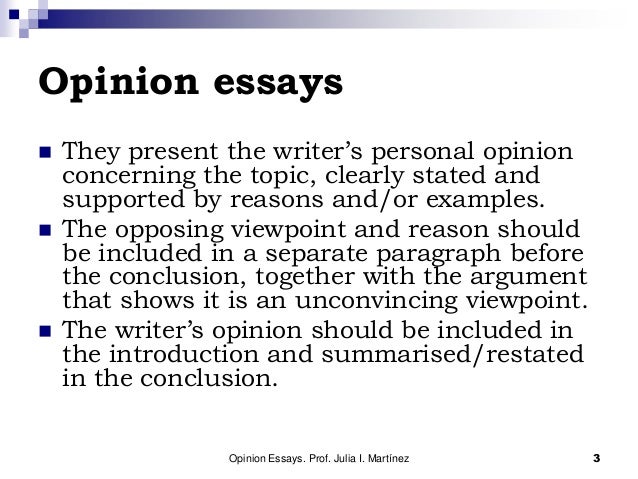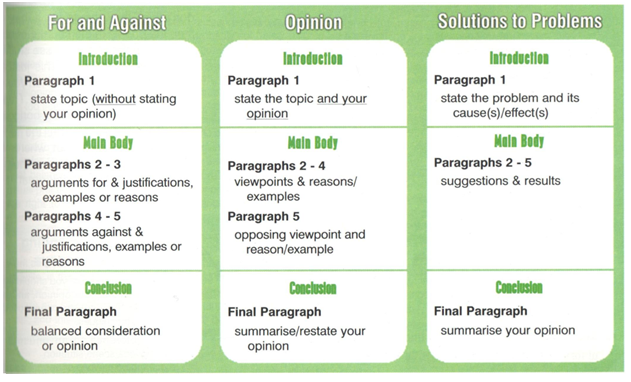A.- PLAN
PARAGRAPH 1
· Introduce the topic and give your opinion. Say whether you agree or disagree with the statement.
|
PARAGRAPH 2
· Give a reason to support your opinion.
|
PARAGRAPH 3
· Give a second reason to support your opinion.
|
PARAGRAPH 4
· Summarize your ideas and repeat your opinion using different words.
|
BASIC DO'S IN WRITING AN OPINION ESSAY
|
Introduce each paragraph with a topic sentence, outlining the main ideas.
|
Do not write about advantages or disadvantages or points for or against.
|
Write in formal style.
|
BASIC DON’T'S IN WRITING AN OPINION ESSAY
|
Don’t use colloquial expressions.
|
Don’t use short forms.
|
Don’t use emotive vocabulary.
|
Don’t give personal examples.
|
B.- VOCABULARY
EXPRESSING OPINIONS
| |
In my opinion, ….
|
En mi opinión…
|
Personally, I think/ I believe (that)…
|
Personalmente, creo que…
|
I strongly believe that….
|
Creo firmemente que…
|
It is clear (to me) that…
|
Me parece evidente que…
|
I feel very strongly that…
|
Siento firmemente que…
|
I (completely) agree/disagree with …
|
Estoy (totalmente) de acuerdo/ en desacuerdo con….
|
It seems to me that…
|
Me parece que..
|
As I see it, …
|
Como yo lo veo…
|
To my mind….
|
En mi opinión,…
|
In my view,…
|
Desde mi punto de vista,…
|
From my point of view, ….
|
Desde mi punto de vista,…
|
As far I am concerned, …
|
En cuanto a lo que a mí respecta,…
|
I am sure/ convinced that …
|
Estoy seguro / convencido de que…
|
I (dis)agree with the statement, because …
|
Estoy de acuerdo/ en desacuerdo con la afirmación porque…
|
GIVING REASONS
| |
My main reason is….
|
Mi razón principal es..
|
Another reason is…
|
Otra razón es…
|
One reason for… is ….
|
Una razón para…. es….
|
Many people say/ believe that…
|
Mucha gente dice/ piensa que..
|
Because…
|
Porque…
|
Since…
|
Puesto que/ ya que…
|
Because of/ due to…
|
Debido a…
|
EXPRESSING FACTS
| |
It is widely known that…
|
Es ampliamente conocido que..
|
It is a well-known fact that …
|
Es un hecho bien conocido que…
|
Research has shown that…
|
La investigación ha demostrado que…
|
There are definitely…
|
Definitivamente hay…
|
It is a fact that…
|
Es un hecho que…
|
It is clear/ true that…
|
Está claro que/ es verdad que…
|
For example/ for instance,...
|
Por ejemplo,…
|
ADDING IDEAS
| |
What is more,…
|
Y lo que es más,..
|
Moreover/ furthermore/ in addition (to)
|
Además,…
|
Apart from (that)…
|
Aparte de…
|
Firstly,…
|
En primer lugar,…
|
First of all,…
|
En primer lugar,…
|
Secondly,..
|
En segundo lugar,..
|
Thirdly,…
|
En tercer lugar,..
|
Lastly,…
|
Por último,..
|
Finally,…
|
Finalmente,…
|
EXPRESSING CONTRAST (LINKERS OF CONTRAST)
| |
ALTHOUGH (aunque)
|
Although I was feeling depressed, I went to the party.
|
DESPITE (a pesar de)
|
Despite the rain, I went to the party.
Despite feeling depressed, I went to the party.
|
IN SPITE OF ( a pesar de)
|
In spite of the rain, I went to the party.
In spite of feeling depressed, I went to the party.
|
EVEN IF (incluso si)
|
I will go to the party, even if I feel depressed.
|
WHEREAS (mientras que)
|
Adults can make their own decisions, whereas teenagers have to do what other people tell them.
|
HOWEVER (sin embargo)
|
Mike is a very good singer. However, he can’t play any instruments.
|
IN CONTRAST
| |
BUT (pero)
|
Their music is very good. But, their lyrics are not very interesting.
|
ON THE ONE HAND….. ON THE OTHER HAND (por una parte…. por la otra)
|
On the one hand, they are extremely rich. But on the other hand, they have lots of debts.
|
EXPRESSING PURPOSE (LINKERS OF PURPOSE)
| |
We use linkers of purpose to introduce reasons:
| |
SO (THAT) (para)
|
I have brought a microphone so that the audience will be able to hear us.
|
IN ORDER TO ( para)
|
We need to register with the council in order to vote.
|
TO (para)
|
I am phoning to ask information about the event.
|
SO AS TO(para)
|
We all need to vote so as to express our opinions.
|
CONCLUDING THE ESSAY
| |
TO SUM UP,…
|
Para resumir…
|
TO CONCLUDE,…
|
Para concluir…
|
IN CONCLUSION,…
|
En conclusion…
|
IT IS CLEAR THAT…
|
Está claro que
|
IN SHORT
|
En resumen…
|
ON THE WHOLE
|
En general…
|
ALL IN ALL,…
|
En conjunto, en terminus generals,…
|
“The teenage years are the best years of your life”. Do you agree?
People often say that the teenage years are the best years of your life. However, I do not agree with the statement.
Firstly, most teenagers have little independence. They have to do what they are told by their parents and
teachers. In addition, they usually do not have much money.
Secondly, teenagers may not have the responsibilities adults have, but they have other worries. Teenagers have a
lot of pressure form exams, which can determine the rest of their life.
All in all, teenagers have a lot of fun, but I believe that the best years of your life come when you are a bit older, with
a job, money and the freedom to do what your like.


